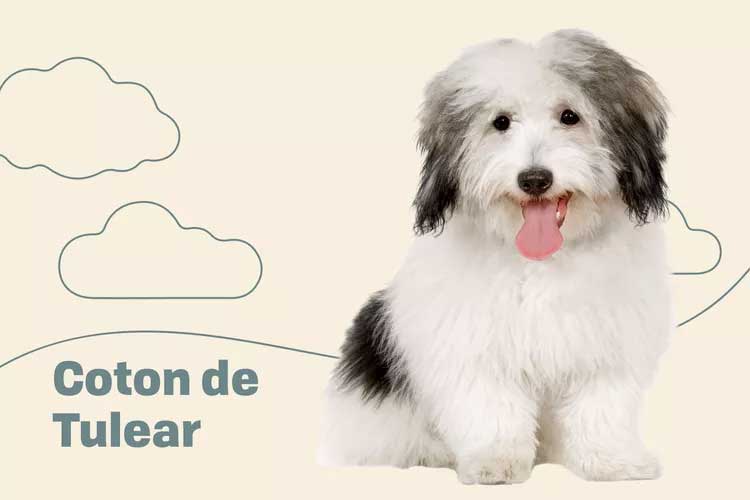Cotons de Tulear are bright, affectionate dogs who love children and make loyal family pets. If you’re looking for a hypoallergenic dog or puppy that doesn’t shed, this lovable breed is a great choice for owners with pet allergies.

Coton de Tulear Overview
| OFFICIAL NAME | Coton de Tulear |
| COMMON NAME | Coton de Tulear |
| PET HEIGHT | 9 to 12 inches |
| PET WEIGHT | 8 to 13 pounds |
| LIFESPAN | 14 to 17 years |
| GOOD WITH | cats, children, dogs, families, seniors |
| TEMPERAMENT | anxious, friendly, gentle, outgoing, playful |
| INTELLIGENCE | high |
| SHEDDING AMOUNT | infrequent |
| EXERCISE NEEDS | medium |
| ENERGY LEVEL | active |
| VOCAL LEVEL | howler |
| DROOL AMOUNT | low |
| BREED GROUP | non-sporting |
| BREED SIZE | small (0-25 lbs.) |
| COAT LENGTH | long |
| COLORS | white |
| OTHER TRAITS | apartment-friendly, easy to train, high potential for weight gain, hypoallergenic, loves water, requires lots of grooming, strong loyalty tendencies, tendency to chew |
Coton de Tulear (pronounced "ko-tawn day too-lee-are") dogs are known for their fluffy white coats, small but sturdy stature, and rich history as a favorite pet of royals. Though tiny, these dogs have a big heart and tons of personality. Cotons are playful companions who love nothing more than hanging out with their humans or training on the agility course.
These energetic, happy-go-lucky pets are quick to cuddle and make great family dogs, thanks to their gentle nature and patience with children. They're often described as witty, funny, and vocal—they love to entertain and will clown around to get the attention they desire.
Cotons are as close to hypoallergenic as you can get, non-shedding, and have low dander, so they're an excellent choice for some owners with allergies. But know there's no such thing as a truly hypoallergenic dog, so always spend time with a breed to see how your allergies react before bringing home a puppy.
Cotons avoid extinction today only through responsible breeding. Because they're rare dogs, coton de Tulear puppies typically cost between $2,000–$3,000 from a reputable breeder.
Appearance
Coton means "cotton" in French, and these fluffy little dogs fit the name. Their long, soft coat is actually considered hair, not fur, which helps contribute to their nearly hypoallergenic status. They're typically low-shedding, but they may shed their puppy coat before their adult coat grows in.
Cotons de Tulear are most often white, but puppies can be born with yellow, brown, or black spots that can disappear or fade into a lighter gray or champagne color as the dog matures. Cotons have dark, round, wide-set eyes and a bright demeanor.
The standard coton measures about 18 inches long, and they are slightly longer than they are tall—full-grown males are 10–12 inches tall and females are 9–11 inches. You can expect your coton to weigh between 8–13 pounds, with females weighing slightly less than males.
Temperament
Cotons de Tulear are incredibly sweet, loyal, and friendly, with a gentle nature that lets them get along with other dogs, cats, and children. Their high intelligence and desire to please make them very trainable and extremely entertaining, says Eileen Narieka, vice president of the United States Coton de Tulear Club (USCTC)."The coton de Tulear is a happy, even-tempered dog," she says. "He is highly intelligent, trainable, and loves to interact with his owners, who find him to be very charismatic, rather clown-like, and delightfully entertaining as he stands on his hind legs, dancing and twirling for joy."

Cotons de Tulear are soft dogs in nearly every sense of the word, right down to their cuddly, childlike personalities. These dogs are absolutely loyal and devoted to their owners, but without socialization cotons can be reserved and cautious around unfamiliar faces. Introduce him to other pets and people early for a seamless transition into adulthood.
The petite coton may not be much in the way of a guard dog, but he's quick to sound the alarm at anything that passes his house—even a squirrel. And while he'll bark at neighborhood wildlife, Narieka says, cotons are not incessant barkers, especially with the right training. But they can be talkers.
"Cotons possess rather unique vocalizations and make soft, engaging sounds that seem to be telling you a story," Narieka says. "This is often accompanied by the endearing 'coton head tilt' that is sure to make you smile."
Living Needs
"Living with a coton is an absolute joy," Narieka says. "Their playful, loving spirit and loyalty are definitive characteristics of the breed. Cotons are very loyal and thrive on your attention but have the ability to entertain themselves, content to simply be near you."Cotons are playful by nature and live a fairly active lifestyle. They do well with a little room to run and play inside a fenced yard, even a small one. A coton can also enjoy apartment life as long as he has plenty of opportunity to get outside and see the world by leash. Hitting the streets for a 30-minute walk once or twice a day is a great way to get your otherwise-lapdog a workout.
Since a coton de Tulear is sure to get along with nearly all the people and pets in your home, they make a wonderful family dog—as long as there is always somebody around, that is. More than most dog breeds, the coton hates to be left alone for more than a few hours at a time. If he is, your adorable coton is likely to show his displeasure with chewing. That's why the coton makes an excellent companion for stay-at-home workers, seniors, or empty nesters.

If you're always on the go and still want the camaraderie only a coton can offer, these dogs make excellent travel companions and are more than happy to join their humans on vacations and adventures.
Care
Frequent, dedicated grooming is a requirement with this beautiful breed. Cotons de Tulear need to be bathed once every one to three weeks and brushed at least three to four times a week. Regular ear cleaning, nail trimming, and tooth brushing is important too.When brushing his coat, be sure to get as close to the skin as you possibly can (very gently, of course). The hair closest to the skin is most likely to get matted and needs more care. Pay close attention when their adult coat begins to grow in, at around 1 year old, as it's especially prone to matting. Use a metal comb or pin brush to groom your coton de Tulear—traditional ball-end brushes can damage your pup's delicate hair. You can let your coton grow their signature long locks, or keep them in a "puppy cut" for easier grooming. If your coton's coat does become matted, keep brushing sessions short and offer lots of praise and rewards for his patience as you work out the tangles.

Cotons respond best to gentle training that focuses on positive reinforcement. They can have a bit of a willful streak, which tends to show up during potty training. Housebreaking the coton de Tulear can be a frustrating and lengthy process for some, but tender reinforcement with lots of patience over the course of a few weeks does the trick. Positive crate training may also be effective.
Oral praise and a treat can go a long way in training the people-pleasing coton. "They generally are quick to learn and easy to train," says Jennifer Frione, DVM, owner of Lakeside Animal Hospital in Ft. Lauderdale, Fla.
Your coton should eat dog food made from high-quality ingredients. Monitoring food and exercise is an important part of care, as cotons have the ability to gain an unhealthy amount of weight. A visit to your vet can help you determine how much and how often to feed your coton.
Health
Cotons de Tulear are generally healthy dogs with a long lifespan of 14–17 years. The most common health issues for cotons are skin allergies, which can lead to bacterial infections, and ear problems if not cleaned properly.Cotons are prone to a few minor medical conditions, Frione says, including hip dysplasia, progressive retinal atrophy (PRA) and, luxating patella (knee issues).
History
Many experts consider cotons an ancient dog breed with the same common ancestor as the bichon frise and Maltese, according to the USCTC. Small white lap dogs appear prominently in Renaissance paintings, and breed historians assert those are an earlier incarnation of today's sweet coton de Tulear.The history of the breed reads like a fantastical storybook. The tale starts with a shipwreck off the coast of Madagascar's port of Tulear, where it's said no humans survived, but a pack of small white dogs swam ashore to safety. Those dogs who swam ashore then mated with the local dogs, resulting in the cute cotons we recognize today.
While their origin story is legendary, it's hard to know the exact truth about the birth of this lovable little breed, according to the USCTC. What's known for certain is that Madagascar's elites were so enamored by cotons they passed laws prohibiting those outside the ruling class from owning a coton de Tulear. The hiding away of these precious pups meant the breed thrived in isolation for centuries, only entering the world stage in the 1960s after being discovered by French tourists.
Cotons were then brought to Europe and North America, where they are bred today. The American Kennel Club officially recognized the coton in 2014.
Fun Facts
The name coton de Tulear comes from the French word for cotton, and the breed's place of origin: the Madagascan port of Tulear.The beloved coton de Tulear has been featured on a postage stamp.
Famous owners of cotons include Carrie Fisher, Barbara Streisand, Debra Messing, and Jane Fonda.